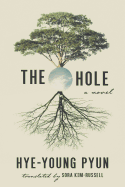
By the time Hye-young Pyun's taut psychological thriller The Hole has tightened its grip on the unsuspecting mind, it's too late to escape. The shadows lurking in the novel become manifest, and dark poetic justice reigns.
It takes a maestro to create a short novel of such atmosphere and depth. Pyun is a rising star in contemporary Korean literature, known for her short stories. Sora Kim-Russell's excellent translation of The Hole finally brings Pyun's impressive novelistic talents to an English-speaking audience.
The novel is a deceptively simple story of loss and grief. Oghi, a South Korean professor of geography, awakes from a coma paralyzed, incapable of speech and terribly disfigured. His wife has perished in the same car crash that crippled him. With no other family, Oghi's forlorn mother-in-law becomes his sole caretaker. Pyun seamlessly switches from her characters' present situation to flashbacks. As secrets from Oghi's past gradually emerge, the relationship between Oghi and his mother-in-law thickens with unspoken tension.
The Hole is an exercise in subtlety. Pyun begins with slow-burning character studies of Oghi, his wife and their respective parents: their shortcomings and resentments, their arguments and power struggles. The novel's greatest symbol becomes the garden outside Oghi's townhouse, where his late wife tried to grow plants and flowers with little success. The only plants that survived were the climbing vines, "planting their roots wherever, willfully burrowing, gorging themselves." The Hole is an unshakable novel about the unfathomable depths of human need. --Scott Neuffer, freelance journalist, poet and fiction author

